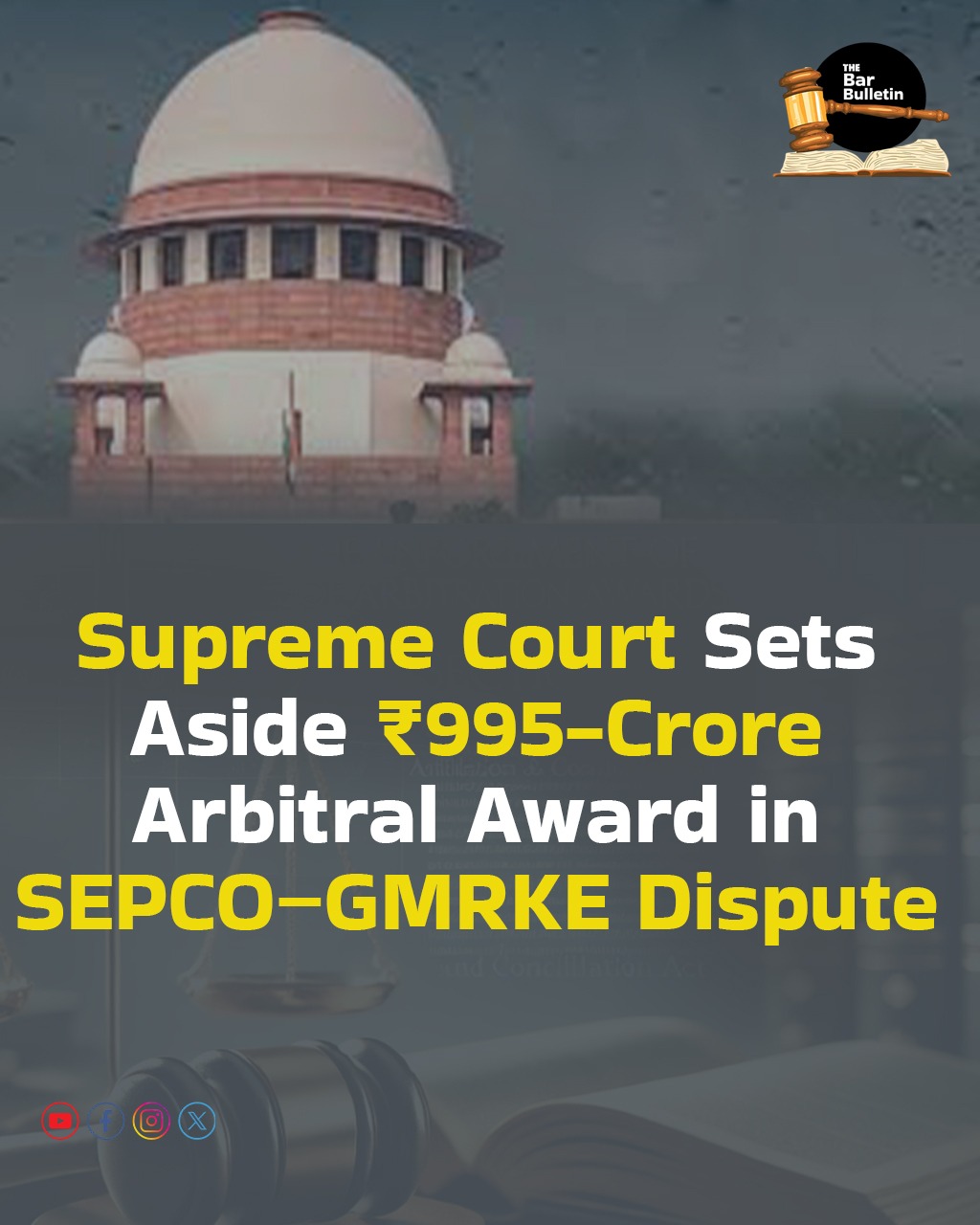The Supreme Court set aside a massive arbitral award of nearly ₹995 crore granted in favour of Chinese contractor SEPCO Electric Power Construction Corporation, ruling that the arbitral tribunal had misinterpreted core contractual provisions, relied on mistaken facts, and exceeded its jurisdiction in deciding the high-stakes dispute with GMR Kamalanga Energy Ltd. (GMRKE).
The case arose from a series of contracts signed in 2008 between SEPCO and GMRKE for the construction of three 350-MW coal-based power units in Odisha, later expanded to include a fourth unit that was eventually suspended. Following delays, disruptions, and disputes over coal supply, site access, and payment claims, SEPCO invoked arbitration in 2015. In September 2020, a three-member arbitral tribunal found largely in favour of SEPCO, awarding it close to ₹995 crore after adjusting claims and counterclaims.
GMRKE challenged the award under Section 34 of the Arbitration and Conciliation Act, 1996 before the Orissa High Court. While a Single Judge in 2022 upheld the award, a Division Bench in 2023 overturned it, holding that the tribunal had effectively rewritten the contracts, wrongly applied the doctrines of waiver and estoppel despite “No Oral Modification” clauses, and relied on erroneous factual assumptions, including misrecording coal-moisture specifications critical to liability findings. The Division Bench further held that the tribunal had treated the parties unequally excusing SEPCO from giving contractual notices while rejecting GMRKE’s counterclaims for lack of notice.
SEPCO approached the Supreme Court, arguing that the High Court had overstepped its limited appellate jurisdiction under Section 37, which is narrower than review under Section 34. It contended that the tribunal’s findings, even if debatable, were within its interpretive domain and could not be interfered with unless they shocked the conscience of the court or violated basic principles of justice.
The Supreme Court, however, disagreed. In its judgment authored by Justice Augustine George Masih, the Court held that the tribunal’s approach amounted to jurisdictional overreach. By disregarding express contractual clauses and creating rights and obligations not envisaged by the parties, the tribunal had “travelled beyond its mandate.” The Court also endorsed the High Court’s view that selective application of waiver and estoppel principles had resulted in unequal treatment, violating Section 18 of the Arbitration Act, which guarantees equal footing to both parties.
Significantly, while arriving at its decision, the Court went beyond the narrow grounds for interference introduced by the 2015 amendment to the Arbitration Act and the restrictive approach adopted in Ssangyong Engineering and Construction Company Limited v. National Highways Authority of India, (2019) 15 SCC 131 and Gemini Bay Transcription Private Limited v. Integrated Sales Service Limited, (2022) 1 SCC 753. Instead, it relied on earlier precedents including ONGC v. Saw Pipes, (2003) 5 SCC 705 and rulings under the 1940 Arbitration Act, thereby broadening the scope of judicial scrutiny over arbitral awards. This expansion, the Court noted, was necessary as the award had disregarded binding contractual terms, misapplied legal doctrines, and violated the fundamental policy of Indian law.
The Court observed that “An arbitral award cannot survive if it shocks the conscience of the court, disregards binding contractual terms, or violates fundamental policy of Indian law” . Finding that the tribunal’s award failed these tests, the Court dismissed SEPCO’s appeal and upheld the Division Bench decision that had annulled the award.
Appearances:
Petitioner(s) :Mr. Neeraj Kishan Kaul, Sr. Adv.; Mr. Jayant Mehta, Sr. Adv.; Mr. Sumeet Kachwaha, Adv.; Mr. Samar Singh Kachwaha, Adv.; Ms. Ankit Khushu, Adv.; Ms. Garima Bajaj, AOR; Ms. Bhavana Chandak, Adv.; Mr. Akshat Khetarpal, Adv.; Mr. Vikramaditya Sanghi, Adv.; Mr. Dhruv Sharma, Adv.; Ms. Dhanya Krishna, Adv.; Mr. Udit Sidhra, Adv.
Respondent: Dr. A.m. Singhvi, Sr. Adv.; Mr. Ashok Parija, Sr. Adv.; Mr. Ciccu Mukhopadhaya, Sr. Adv.; Mr. Mahesh Agarwal, Adv.; Mr. Prashant Pakhidey, Adv.; Mr. Manu Krishnan, Adv.; Ms. Aanchal Mullick, Adv.; Mr. Manav Gill, Adv.; Mr. Daksh Arora, Adv.; Mr. Avishkar Singhvi, Adv.; Ms. Swastika Parija, Adv.; Mr. Nidhiram Sharma, Adv.; Mr. E. C. Agrawala, AOR
![]()



